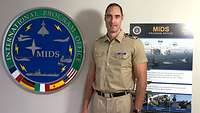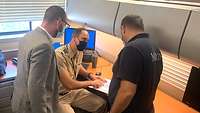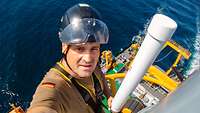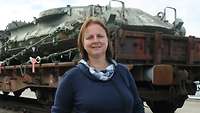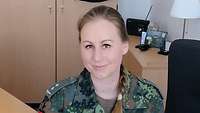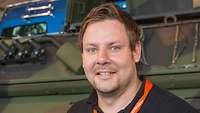Lieutenant Colonel Andreas Schreiner — a German soldier in the USA
Lieutenant Colonel Andreas Schreiner — a German soldier in the USA
- Place:
- Reston
Schreiner, who was born in Bavaria, began his military career in Germersheim, Rhineland-Palatinate, in 1997. After studying mechanical engineering at the Bundeswehr University Hamburg, he was assigned to various duty stations in Germany and abroad. In summer 2019, the father of two moved “across the pond” for a very special foreign assignment in the USA with the German Liaison Office for Defense Materiel, U.S.A./Canada.
However, the serviceman is not assigned to the headquarters in Reston, Virginia, but will perform his duties as “platform representative” together with personnel from the other nations at the “MIDSMultifunctional Information Distribution System IPOInternational Program Office” in San Diego, California, until autumn 2022.
Lieutenant Colonel Schreiner, could you please explain what “MIDSMultifunctional Information Distribution System IPOInternational Program Office” means?
Yes, of course. “MIDSMultifunctional Information Distribution System IPOInternational Program Office” is short for “Multifunctional Information Distribution System International Program Office”.
The programme office manages the requirement, further development and contracting for the manufacturing and delivery of digital message devices with optional encrypted voice transmission and tactical air navigation. These digital message devices are used in aerial, sea- and land-based systems.
As platform representative, I am the central point of contact for the requirements of both, the requesting German elements and the integration programme at the NATONorth Atlantic Treaty Organization management agency NETMANATO Eurofighter 2000 and Tornado Management Agency. In my capacity at the programme office, I cooperate closely with personnel from the USA, France, Italy and Spain.
What does your daily work routine look like?
Of course, my work routine is currently being heavily affected by the COVID-19Coronavirus Disease 2019 pandemic. Almost all members of the programme office have been working from home. Before the pandemic, it was customary for the most important representatives of the various project partners to meet at conferences in Europe or the USA almost monthly.
During the past year, however, all transatlantic communication requirements were satisfied in conference calls and video conferences. Even in-house coordination happened online. But, just like anywhere else, in-person meetings are also becoming increasingly important here.
Especially in case of negotiations in a foreign language, it is important to be able to assess the counterpart. After all, gestures and facial expressions play just as important a role as language. For this reason, the programme office is currently preparing to begin resuming in-person conferences starting in late 2021.
What challenges are you facing?
The industry’s regularly limited production capacities are often the subject of tough negotiations. Once the partner nations’ representatives and I have reached an agreement on a feasible concept, we accompany the programme office’s contracting department throughout negotiations with the industry. This is to ensure that our requirements are implemented correctly. At the same time, this enables us to react quickly in case individual aspects do not seem feasible.
Of course, our responsibilities also include quality assurance and schedule control. If we identify difficulties, we implement measures to improve the situation with the competent departments.
What about international cooperation?
Our overall work as a team is of course filtered through our respective national lenses, because all members of the programme office must also defend their national interests. But we must still combine it all to form one joint plan that can be contractually implemented with the industry.
Although Western nations have much in common, they all have their idiosyncrasies. This also applies to their individual negotiating styles. Especially in the USA, indirect communication plays a major role. It requires a lot of patience and finesse to ultimately effectively address the real issue. I would say these cases require a bit of diplomatic tact.
What about the technical aspect? You are acting on behalf of Germany on American territory.
Our contracts are concluded under USUnited States law, not under German public procurement law. Export control regulations and access to information are strictly regulated, even among participating nations. Furthermore, many project partners are located in Europe and the European manufacturers of the message device are headquartered in Paris, as well. This results in a nine-hour time difference relative to San Diego. This limits the time frame for talks between different locations in San Diego to the early mornings. Even when communicating via e-mail across the Atlantic, I always have to plan for the response to take a day.
Finally: How is your family liking California?
For an adventure like an assignment abroad, the most important thing sometimes is that your family adjusts well to their new home. The Bundeswehr community in San Diego is small and the responsible administrative authority is located in Reston, Virginia, on the East Coast. But thanks to the others here, we settled in quickly.
Since there is no German school in San Diego, we looked for an apartment in a school district with good primary schools. Thanks to the support from the German Liaison Office for Defense Materiel, U.S.A./Canada, our children now attend a regular American primary school. Six months after moving here, the children’s English skills naturally still were bit lacklustre. By now, both speak with an impeccable California accent and regularly correct our pronunciation. They sometimes complain that they have to catch up on German at home in the afternoon, since it is not taught at school.
We hope that our experience here will not only broaden my professional horizon, but also provide my children impressions and skills they will hopefully benefit from throughout their lives.
San Diego is a unique environment that my family enjoys just as much as I do. There are a lot of items to still cross off our bucket list before we return to Germany.


